Proto winner confirmed in Mini Transat
Published on November 14th, 2019
(November 14, 2019; Leg 2; Day 13) – At 17:00 UTC today, François Jambou won the second leg of the Mini Transat in the Mini 6.50 prototype category, finishing the 2700 nm Atlantic crossing from Las Palmas de Gran Canaria to Le Marin in Martinique in 12 days, 02 hours, 27 minutes, and 07 seconds. As a result, Jambou is the outright champion in the proto class of this 22nd edition.
Aboard the boat that is the reigning champion of the race, the 35-year-old Jambou took control of the fleet after two days of racing and never let go from that moment on.
“I feel very moved and I just can’t get my head around what I’ve achieved,” said Jambou. “I’ve made a lot of sacrifices that all seem to make sense with this victory. My whole life has been geared around this, around making it this far. I haven’t had a salary for the past year and a half because I stopped working.
“I haven’t really been there for my 3-year-old son of late either. My partner has been behind me all the way and I thank her for that because without her I’d have never been able to do this. This victory will change my life. There will be a before and an after.”
To win you must finish, and Jambou shared how he never forgot that. “I was in a mode where it was important not to break the boat. I had my foot on the brake at the start. Maybe the others wanted to go too hard too soon and broke. I was really at average speed mode. There were lots of times where I could have pushed the boat harder, but as soon as it started slamming, as soon as there was a strange noise on the boat, I calmed things down a bit, whilst keeping a good eye on the ranking. On the GPS, when you see there’s still 1,500 miles to go, you don’t want to do them under jury rig. We’re sailors first and foremost rather than racers.”
The second leg lived up to its billing as offering ideal trade wind conditions. “I hoisted my spinnaker at the start and I just dumped it here. I’ve only done one mile of upwind sailing. It was a fantastic sail. The boat was planing the whole time. There were some superb seascapes, sunshine at a low angle… you couldn’t wish for better.
“Mentally it was more difficult and I found it hard to manage the stress of competition. It’s one hell of an experience. I feel like I’ve made a massive amount of progress and got a good grasp of a whole bunch of stuff and that too is gratifying. I couldn’t lay claim to being assured of the win, because there were some fantastic sailors, fabulous boats, and in the first leg I was a bit unlucky at the end.”
In the production class, Ambrogio Beccaria has less than 150 miles to go, securely in the lead by 100 miles.
“One sailor who has impressed me is Ambrogio. I think he’s the best sailor I’ve ever seen. He’s impressive. Jostling for first place with the production boats as if they were the top prototypes, that was the most striking fact of the race. I was completely amazed. Inevitably, when the wind eased a little, I was able to make good my escape with my more powerful, lighter boat, but all the same there’s a magnificent standard in the Mini and that’s good for the class and it’s good for the sport.”
Event details – Entry list – Tracker – Facebook
The biennial Mini-Transat La Boulangère has competition for the Mini 6.50 Class in two divisions: the prototypes and the production boats.
Production boats are built out of fiberglass, have alloy masts, 1.6 meter draft, and prohibit material such as titanium, carbon fiber, and epoxy resin. Ten boats must have been built to qualify as an official production boat.
Prototypes, on their side, are free of these restrictions and have been, for years, the very first laboratory for sailing innovations. Canting keels, daggerboards, swinging wing masts, long poles for huge spinnakers, have been tried first on minis. New hull shapes with very wide waterlines and foils are the now the latest innovations.
Race Format:
Eighty-seven started the first leg on October 5 (delayed from September 22 due to storms) from La Rochelle, France and extends 1350 nm to Las Palmas de Gran Canaria. After an often complicated exit of the Bay of Biscay, sailors will expect some long slips down the Portuguese coast before arriving after 7 to 10 days in the Canary archipelago.
Eighty-two started the second leg on November 2 from Las Palmas de Gran Canaria and will take from 15 to 20 sailing days to complete the 2700 nm course and reach Le Marin in Martinique, French West Indies. Due to the numerous islands, the restart from the Canary can be tricky before reaching the famous trade winds that offer a long downwind run.
Source: Effetsmer


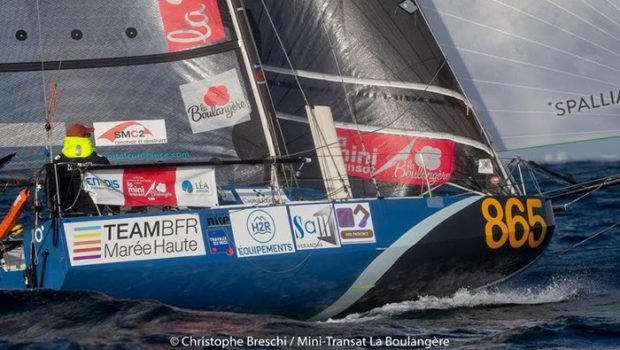



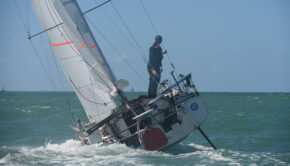
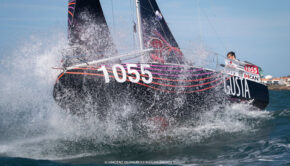
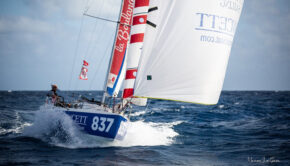
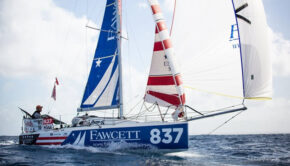
 We’ll keep your information safe.
We’ll keep your information safe.